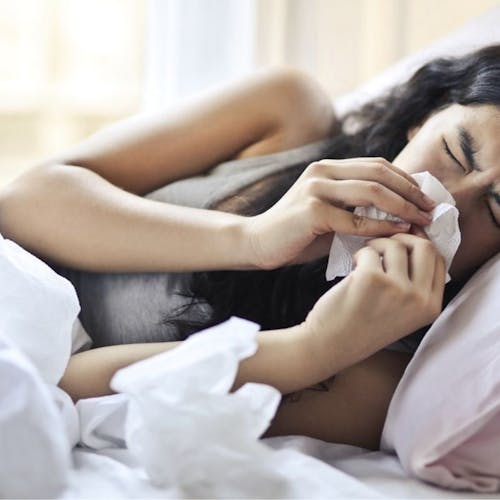This website uses cookies to enhance the user experience. By using Yoppie you are agreeing to our use of cookies.
Menstrual Migraines: How To Manage The Hassle Of Hormonal Headaches
Written by Yoppie
22 Jun 2020
First of all, is it a migraine or a headache?
What kind of migraine is it, and what’s causing the pain?
How do I know which type of migraine I have?
What else could be a contributor?
What are the symptoms?
What can I do about it?
The cause of the typical migraine has long been a mystery, but did you know that while just 1 in 15 men suffer from these pesky pains, a whopping 1 in 5 women experience them? No prizes for guessing what makes the condition more common in women! Yup, periods. Let’s find out more about why, and what you can do to combat the symptoms of menstrual migraines.
First of all, is it a migraine or a headache?
Good question. Migraines are very different from headaches, in that they mostly cause localised pain that begins in one particular area of the head. Migraines can also cause sufferers to experience other symptoms around 30 minutes before the head pain part even begin, such as changes in smell, taste or touch, numbness or tingling sensations in the hands or face, flashes of light, unusual lines in their vision, confusion and brain fog.
Put simply, migraines are much more severe, so it’s usually easy to tell the difference between this and a headache.
What kind of migraine is it, and what’s causing the pain?
There is a difference between your period cycle affecting your migraines, and actually having what’s known as a “menstrual migraine”. Menstrual migraines can occur when levels of oestrogen drop, and according to the Migraine Trust, most commonly happen in the two days leading up to, and throughout the first three days of a period.
It is thought that menstrual migraines affect less than 10% of women, whereas around 50% of women who suffer from regular migraines say their menstrual cycle can still directly affect this, likely due to fluctuating hormones in their system.
How do I know which type of migraine I have?
If you experience pain but aren’t sure whether it’s a regular migraine or a menstrual migraine, the Migraine Trust recommends keeping a period diary for at least 3 months to track and identify when the headaches and migraines occur most often in relation to your period and ovulation.
Unfortunately, there are no tests to diagnose menstrual migraines, so knowing this information about yourself could make a huge difference, and also help to identify any external triggers (i.e. foods or activities) that you may want to avoid at particular times of the month.
What else could be a contributor?
Lots, actually! The NHS states that periods aren’t the only trigger of hormonal headaches - the combined oral contraceptive pill could be to blame in some cases. Some women experience an improvement in their headaches while taking this contraception, and others experience more frequent pain, so understanding how your own body is reacting to it could help you narrow down the root cause. Other possible causes include menopause and even early pregnancy.
What are the symptoms?
As the name suggests, headaches cause an ache in the head, but as we mentioned, migraines are usually more severe than just an ache. According to the National Headache Foundation, the pain usually begins on one side as a throbbing headache and can go on to cause nausea, vomiting, or even sensitivity to bright lights and sounds. This can last anywhere between several hours and several days.
What can I do about it?
Whether it’s a menstrual migraine or only loosely related to your period, the NHS recommends preventative measures like eating small snacks more often during the day to maintain blood sugar levels, regulating your sleep pattern, and limiting stress as much as possible. The Mayo Clinic also suggests that migraine sufferers may find some relief by holding a cold cloth or towel-covered ice pack to the area.
If your pain is particularly bad and negatively affecting your life, speak to your GP about the possibility of taking anti-migraine medicines, reviewing your contraceptive pills, being prescribed anti-inflammatory painkillers or oestrogen supplements, and other possible treatments. Headaches and migraines do happen, but they shouldn’t be impacting your life on a monthly basis.
Do you suffer from menstrual migraines? Let us know when they typically occur for you, and how you manage them, over on Instagram @itsyoppie. Don't forget that our period subscription box can get organic cotton tampons, PMS supplements, and much more, delivered easily and regularly through your letterbox... because life's busy enough, even if your head isn't sore.
Fact checked by Doctor Brooke Vandermolen.
Section jump
Back to top
Subscribe To Our Newsletter
YOPPIE





© 2026 Yoppie is a registered trademark of Phlo Technologies Ltd.
Yoppie's supplements are not a substitute for a varied diet and healthy lifestyle and are not intended to diagnose, treat, or cure any disease. If you are pregnant, breastfeeding, have a medical condition or are under medical supervision, please consult with your doctor before taking any of our products.






